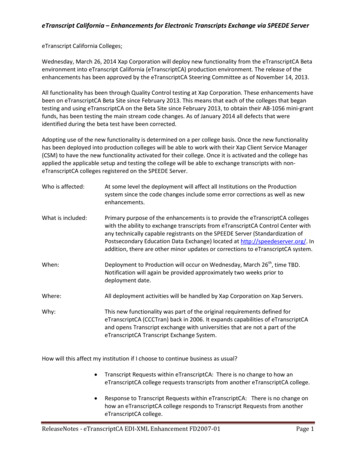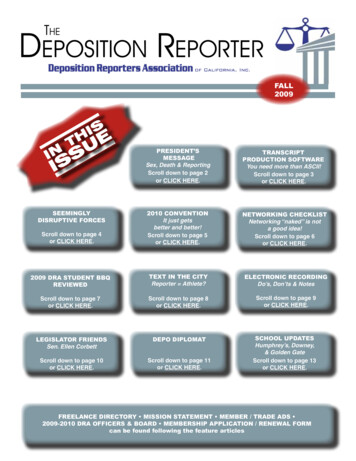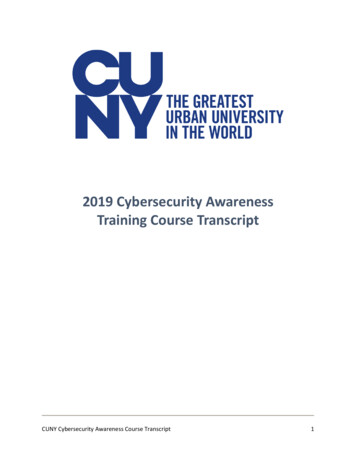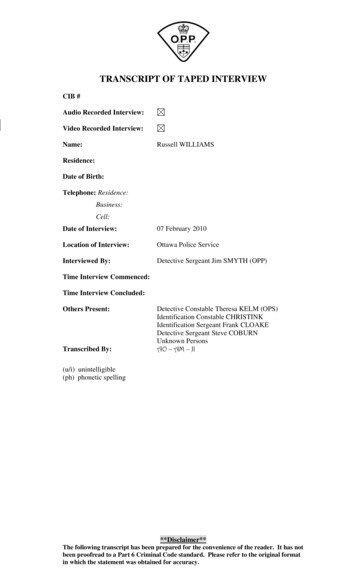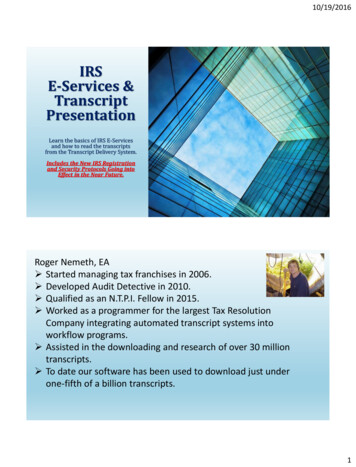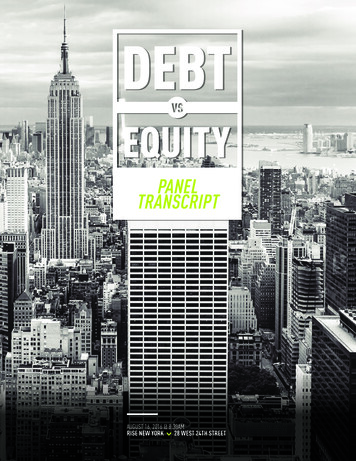
Transcription
PANELTRANSCRIPTAUGUST 16, 2016 @ 8:30AMRISE NEW YORK 28 WEST 24TH STREET
MODERATED BY:PANELIST:PANELIST:FOUNDEREMPIRE STARTUPS@jonzanoffCO-FOUNDER / PARTNERGREYCROFT PARTNERS@sigalowMANAGING PARTNERBDMI VENTURES@uceteJON ZANOFFIAN SIGALOWURS CETEJon Zanoff is a FinTech productIan is a Partner and Co-Founder ofUrs is the Managing Partner of BDMI. Hemanagement guru and founder ofGreycroft LLC. Over the past ten yearsis also a founding member who joinedIan has led numerous investmentsBDMI as Chief Financial Officer in 2006for Greycroft, including the firm’sfrom the Corporate Controlling andEmpire Startups. Currently, Jon is anEntrepreneur In Residence at Techstars,investments in Buddy Media (acquired byStrategy group at Bertelsmann wherelowering barriers to entry to accelerateSalesforce.com), Braintree (acquired byhe was “chief of staff” to the CEO andFinTech innovation. Prior to joiningeBay), Venmo (acquired by Braintree), andworked on strategic projects for all ofTechstars, Jon worked in productVizu (acquired by Nielsen).the media company’s divisions. Urs hasstrategy at Blackrock. Jon has heldled investments in CrowdTwist, MojivaPrior to joining Greycroft, Ian founded(acquired by Pubmatic), Skimlinks,StrongData Corporation, a pioneer inStyleHaul (acquired by RTL) and Zergnet.product development in financialpayment encryption, and spent severalUrs was a Ph.D. Candidate at theservices, including at Goldman Sachs/years as a venture capitalist with BostonHandelshochschule Leipzig and holds aREDI Technologies, Instinet LLC, andMillennia Partners, where he focusedDlpl.Kfm degree in finance and strategyon the software, wireless, and Internetfrom the HHL Leipzig Graduate School ofsectors.Management. He also earned an M.B.A.a variety of roles driving technologyE*TRADE Financial.in finance from Tulane University.Ian’s past experience also includesinvestment banking in the technologyUrs was named a 2014 Power Player ingroup at Donaldson, Lufkin, and JenretteDigital Media by AlwaysOn and was on theand strategy consulting with the ArnoldGlobal Corporate Venturing Powerlist inBusiness Strategy Group.2012, 2013 and 2014.
PANELIST:PANELIST:MICHAEL MORRETTIJAKE SKINNERFOUNDERFEMALE FOUNDERS FUND@suitandongMANAGING DIRECTORSILICON VALLEY BANKVP STRATEGYFASTPAYSUTIAN DONGSutian Dong is a Partner at FemaleFounders Fund. Most recently, Sutianwas a Senior Associate at FirstMarkCapital, an early stage venture capitalfirm based in New York City. Shefocused investments in the healthcareIT, fintech, e-commerce, andconsumer application space.Previously, she was Director ofMarketing for Norisol Ferrari, aNew York based couture and luxuryouterwear brand. She also heldSales and Marketing positions atMichael Moretti runs Silicon Valley Bank’sNew York office. He is responsible formanaging all relationship and businessdevelopment activities with technologycompanies in the tri-state region. Priorto joining SVB in October 2003, Michaelworked at LCconnect Inc., an onlinefinancial services company he co-foundedin January 2000. Previously, Michael hadbeen involved in the international, corporateand investment banking markets since1982. Prior to starting LCconnect, Michaelwas co-head of Credit Lyonnais Securities’Corporate Advisory Group, which he startedin 1995.MarketFactory, a FirstMark portfoliocompany developing softwareapplications for high-speed tradingplatforms.Sutian holds a B.S. in Finance andMarketing from the Stern School ofBusiness at New York University.PANELIST:Jake leads strategic projects atFastPay and is responsible forcorporate and business developmentinitiatives. Originally from Boise,Idaho, Jake began his career in NewYork working at Goldman Sachs. Heholds a Bachelor’s degree in Politicsfrom Princeton University.FastPay is a funding platformproviding a flexible cash flow solutionfor long payment term invoices forthe digital media industry. FastPay’ssole focus on digital media providesa significant advantage in evaluatingBefore joining Credit Lyonnais in 1991,Michael served nine years at the Irving TrustCompany, which was subsequently acquiredby the Bank of New York. Michael receiveda B.A. from St. Lawrence University andan M.B.A. from the Thunderbird School ofGlobal Management.credit and collateral performance ofborrowers.
Jon Zanoff:[04:15] Alright, I think — Can everyone hear me okay? — Fantastic, a littlebit louder. I’m good at only a few things, one is being loud. Ask my mom,torturous upbringing. Well, thanks everyone for being here, a special thanksto FastPay Evolution and Nomad Financial for putting this on.I am Jon [Inaudible][04:41]. I’m EIR at Tech Stars upstairs. I also run EmpireStartups. It’s the largest community of fintech entrepreneurs. Under TechStars we’ve invested in 800 companies and seen 1 million — not sure if it’spublic — applications [Phonetic][04:57] adjoined.I’ve seeing a lot of companies that are really looking to scale. Ultimately that’swhat today is about. It’s about being able to run instead of walk by raisingcapital. There are lots of different ways.There’s a lot of good information and a lot of bad information on the internet.We have a pretty amazing panel put together to help provide some wisdom andinsight into funding options and best practices. With that I’m going to let thepanel introduce themselves with a brief “Who they are and why they’re here.”Maybe we’ll start with Jake on the end.Jake Skinner:[05:30] Hi, I’m Jake Skinner. I’m the VP of Strategy. I’m also the GM of the NewYork office for FastPay. Prior to this I was at Goldman Sachs here in New York.I went out to LA about 3 years ago.I just came back about 3 months ago. I’m running the office here with a coupleother people in the audience today.Mike Moretti:[05:48] I’m Mike Moretti. I’m with Silicon Valley Bank here in New York, full servicecommercial banks to startups. I’ve been there for about 12 years. For about 4years before that I was a co-founder at a fintech startup. I can relate a little bit.Sutian Dong:[06:04] Hi everyone, I’m [Inaudible][06:04]. I’m a partner at Female Founders’Fund. We’re a New York-based early stage internet and tech startup. Thedifference between us and most other venture funds is that we, as the namesuggests, invest in female founders only.The fund was founded in 2014. I joined quite recently in 2016.You’re lookingat 7 1/2 to eight months if we round up in. We are always on the lookout forCONFIDENTIAL TRANSCRIPT DEBT VS. EQUITY ROUNDTABLE AUGUST 16TH, 2016
interesting female entrepreneurs, ideally before they even start that businessto develop relationships over time, New York, LA and San Francisco for themost part.Urs Cete:[06:37] Hello, I’m Urs Cete [06:38]. I work for BDMI Ventures[06:39], a bigmedia company, [Phonetic][06:40] 120,000 employees. Think of it like a TimeWarner or something like that.I run the venture fund. It’s a corporate VC. It’s a little over 300 million undermanagement investing out of our latest fund which was vintage 2015, which is150 million. We do early-stage investments in media-related startups.We do North America, Europe and Israel.Ian Sigalow:[07:04] I’m Ian Sigalow[07:03] Sigalo. I’m a partner and co-founder atGreycroft. We’re a VC fund based between New York and LA. Today wemanage about 800 million. We’re investing out of our most recent venturefund which is [Inaudible][07:15] started this January.We have a lot of dry pattern.Jon:[07:19] Fantastic. How this is going to work is we’re going to do about 30minutes of questions. For the 30 minutes after that and even for these 30minutes we work for everyone in this room. You’ve got some high-poweredindividuals, some fund-raising experts on this stage.We want your questions. If there are questions that we’re not answeringplease, please raise your hand. I’m going to start it off. A lot of what I hear isjust fundraising is getting harder. Are things changing?Maybe we’ll start on this side with Ian. The space that you’re in — obviouslyyou’re the one writing the checks. Are wallets tightening up in your space?Ian:[08:00] Do you guys hear me by the way? Speak louder? Okay, I’ll speak a littlelouder. I had to write our semi-annual letter which went out yesterday.Urs:Ian:[08:12] I got it.[08:12] You got it, good.[Laughter][08:14]Ian:[08:14] When you’ve got corporate investors it’s great. The series B and latterstage market in particular has been hit very, very hard over the course of thepast year. They track valuations year over year.It’s been down about 47 percent over the last 12 months. It’s not apples toapples to a public market because different companies raised capital in Q2 of2015 than the companies that raised capital in Q2 of 2016.However that type of a step-down would be equivalent to the second-worstperformance over a 12-month period of the US stock market in history. It’sreally awful for growth-stage companies trying to raise [09:01] capital.PAGE 5
The market is reset dramatically. I think that people in San Francisco probablywon’t like this comparison. There was a humongous bubble in venture-backedasset class in general. Growth0stage companies were trading at multiplesthat were in excess of public multiples.We’ve seen that reset. That’s what’s made it so hard for a lot of companies toraise capital. That translates all the way down the stack. If your latter-stagecompanies are in workout situations it’s very hard to put capital to work inearly stage opportunities because you’re too busy.You’re trying to basically harvest capital to make sure you can support yourbigger companies.Jon:[09:47] That’s great. Well, Sutian [09:47] maybe I’ll put you on the spot earlyand often. Is it getting easier for female founders to raise money? What partdo you play in that?Sutian:[09:56] Sure. As a fund we’re early-stage investors. What I mean by earlystage is that we are mostly seed stage investors [Inaudible][10:02] 500K andtypically the first round of institutional financing that a company raises.I will say that fund-raising has always been hard. No matter what it’s nevergoing to get easy. For most people it will never be easy and a walk in the park.That being said, as a fund we track the number of series A financings thatfemale-led companies raise on a quarter over quarter basis.We see that trending up generally and more so in New York and LA than inSan Francisco, which is a little bit interesting. I do think that the diversity ofindustry that female entrepreneurs are starting companies in is widening sothat you have many people starting companies in fintech, in health care, ITand enterprise [Inaudible][10:58] and infrastructure.It widens the pool of capital that would be looking at those startups byfunction of the industries that those funds invested in. It’s a non-answer toyour question. Fundraising has always been hard. We do see more and morefemale companies getting started and more of those getting started.Jon:[11:20] That’s fantastic.Urs:[11:20] If I can interject, there was a time when we had I think twenty to 30percent female-led startups, which is quite high for a fund. It’s now muchlower because we sold them all. They’re all so successful. [Laughter][11:31]We have Style Hall, Hello Giggles. We had a couple of exits which were femaleled. If there are more female founders here just talk to me.Audience:[11:38] Okay.Jon:[11:42] I sort of preface. It’s about scaling a company. Ultimately we’re going to dig intoequity versus depth. It’s ultimately about scaling a company to run. Michael and Jake,how does the role that FastPay plays and SVB plays in helping companies scale?CONFIDENTIAL TRANSCRIPT DEBT VS. EQUITY ROUNDTABLE AUGUST 16TH, 2016
Jake:[11:57] Yeah, no, I think it’s a good example. For SVB they’re really focusedon — [Phonetic][12:04] do you call it? — venture-backed, high growth, greatgroup of investors, great group of executives that are there.I think for us how we look at ourselves is really call it a minor league or a kindof preparatory for bank financing or even VC money as well. We have a lot ofcompanies ni our portfolio that have equity investments.We have companies that have been at banks before and come back. It’s avariety of cases. I think how we see ourselves is call it — Maybe you’re notquite a fit for bank financing yet where you’re waiting for your numbers andmetric to change.I think to Ian’s point what we’ve seen over the last few years is not necessarilya lack of venture capital but almost a difference in terms of how they look atthe metrics. It’s not just all about pure revenue growth.Now they’re starting to think about being profitable. Even the companies thatwe talked to in our portfolio, all of them are saying — I’m sure [Inaudible][12:56] will be profitable by the end of 2016.That’s kind of the march that everyone is on right now. I think for us we lookat businesses that have maybe not been in business for very long or have juststarted to really ramp up their growth and are not quite fit for bank financing.We think SVB is a great place to kind of either graduate some of our biggerclients or be a soft no for some of the banks in the space so that thesecompanies can grow, kind of find their groove, understand their market andthen once they’re ready for profitability, covenants and some of the biggerkind of types of financing we kind of graduate them to a bank.At the end of the day cost of capital is lower. They need that in order to be ableto grow their business.Urs:[13:37] Yeah. I think you should tell him what FastPay does. I’m not 100percent sure everyone knows exactly.Jake:[13:44] FastPay, we are a, call it, accounts receivable lender to digital mediacompanies. A majority of our clients are publishers, ad tech companies, some[Inaudible][13:54], really anything that’s in the value chain for advertising ingeneral.How the business was started is [14:00] really on the premise of delayedpayment terms in the space. You’ve got the major advertisers at the toplike Anheuser Busch, [Inaudible][14:08] and these kind of big premiumadvertisers that everyone gets excited to work with.Their payment terms are ninety, 120 and sometimes 150 days. What that doesis it puts the burden of cash down on some of the lower guys that don’t havetons of cash, that don’t have big, cheap facilities from a Wells Fargo, an SVBor these other guys.PAGE 7
What we do is [14:30] we actually help them take care of those cash flowproblems by financing invoices that they submit to our platform. You havean invoice that gets paid in 90 days by PNG. You can, if you’re a client of us,submit that invoice to us.We underwrite it, price it and then from there we advance that money toyou and collect directly from the advertiser. It’s a pretty seamless product.It works well. It’s an interesting financial instrument for companies that arehigh growth and are trying to get cash in their business.If they’re [15:00] trying to spend their equities smartly, it’s a great way to kindof stretch that runway for cash. That’s what we do.Mike:[15:08] I appreciate the background. That’s why FastPay’s a good [15:10]complement of Silicon Valley Bank. Typically we’ll start with some venturedebt financing. Company could be even potentially pre-revenue.If they’re [Phonetic][15:19] ventured backed there’s the potential for someterminal financing. As they continue to grow and generate a significantamount of receivables, maybe there’s a working capital line that can come in,and they can be profitable not at that stage.If they continue the trend and become [Phonetic][15:32] cash flow positivethen term loans become an option, cash flow, term loans, large revolvingcredit facilities, those kinds of things. It depends on the stage.We just customize the facilities as needed — [Phonetic][15:45] One quick comment, Imeant to add on to what Ian was saying, which we absolutely see, is when companieswant to continue to grow the majority of our clients are still losing money.They do need more capital. If there’s a little less equity capital we’re seeingmore and more looking at that capital’s an option. It has been particularlybusy and not just for SVB. We have a number of competitors out there.Everybody is busy in the capital market at least looking at opportunities so thecompanies can continue to grow.Jon:[16:16] Great. For so many investors on the panel, do you have a preferencewith your fund, debt versus equity? Does it depend on the case?Urs:[16:27] Since we only do equity, do I like it as my portfolio companies add debtto the mix? I think a big chunk of our portfolio has it now. I think a third oreven more than a third have some debt facilities in the startups.For me it depends on the stage. At the end of the day it’s still debt — Nothingagainst your guys. It’s debt. They want their money back. They’re patient,much more patient than a Citibank or someone like that would be.They’re not a VC, not exactly. I think once it’s a little later stage you’ve found productmarket [17:00] fit, I think for that scaling part I love it if you can kind of leverage [Phonetic][17:06] or round up a little bit and add some non-diluted funds to the company.CONFIDENTIAL TRANSCRIPT DEBT VS. EQUITY ROUNDTABLE AUGUST 16TH, 2016
Jon:[17:13] Okay. Ian or Sutian, [17:13], anything?Ian:[17:15] The short answer is yes. Almost all of our companies have some debtfacility. The longer more nuanced answer is about the cost of that. I think mostentrepreneurs don’t really understand the difference between debt and equity.It’s worth noting — I won’t pick on SVB. Let’s take a bank [Crosstalk][17:37]like [Inaudible][17:38].Jon:[17:37] I’m going to [Phonetic][17:38] answer everyone. We want to get in theweeds [Inaudible][17:42]. Everyone in their head just said, “Please tell us moreabout the long-winded answer on what entrepreneurs need to know about debt.”Ian:[17:49] Okay. A bank like Comerica for instance has a rate of return on theirdebt of something like twelve to 13 percent. If you look at this asset classthey’re lending to the startups at [Inaudible][18:05] plus or Wall StreetJournal prime plus a couple points.It ends up being — I don’t know — 6 percentish interest rate. You wonder howthat math works. How do they make the money that they make? There’s acouple answers to that. One is there are all sorts of facility fees and unusedcapital fees and upfront fees and pay-down fees.Then there are warrants which generate some incremental return. The lastpiece, which most entrepreneurs don’t really appreciate unless times aretough, is that the loss rates on this debt need to be very, very close to zero.There are some banks — SVB is particularly good in this regard. Others likeComerica are particularly bad. I hope they’re here [Laughter][18:53] — wherethey get the wind of something not being great. You have a bad quarter andthey sweep your cash.That can be awfully painful if you thought you had a debt line and all of asudden it disappears and you have to make payroll in a week. You get a call ifyou’re the equity guy that says “Hey, we just got our cash swept by Comericabecause we missed our bookings target for Q2,” which is the exact hardesttime it is to raise equity capital.Sometimes those decisions have real ramifications for entrepreneurs that arenot appreciated at the time that they take the money.Urs:[19:32] Maybe [19:33] they don’t like to talk about — I think in our historywe’re only ten to 11 years old. I think there was one case where at the end ofthe day we have to relinquish the keys to the bank.I know they don’t like to take control of assets because if we were not able to sellit — Are they really better at it? Let’s see. It does happen. At the end of the day it’sa bank. If you don’t fulfill your requirements they can take your company.It does happen but not often.PAGE 9
Mike:[19:57] A couple main takeaways from my standpoint — The first thing is thatIan our next lunch is definitely on me, no problem. [Laughter][20:03] One ofthe key things, and that is the whole topic, [Inaudible][20:08] equity.Everybody is going to raise equity and absolutely should in every instance.Debt is case by case. One of the big things that we do at SVB is educate theentrepreneurs we talk to about debt. There are pluses to it.There are absolutely minuses or at least potential minuses to it that everybodyneeds to know about before they go into it. Yes, it can extend a runway. Yes, itcan be cheaper capital — yes, dramatically less dilutive capital, but it’s debt.Any lender will tell you they want to see it repaid. Equity investors are lookingfor as big a return as they can on their equity. Debt lenders want a 1X on theirprincipal. They really want a 1X, not a 0.9X, a 1X.That’s the general mindset. Yes, different lenders have different mindsets interms of what happens if a company trips a covenant, hits a bump in the road.Some of them are more flexible than others.I’d like you to do your homework on which investor you bring in. You should doyour homework on which lender you bring in.Jon:[21:13] Let’s flesh that out a little bit. We’ve talked about some scaryaspects of the repo department coming for your assets. Let’s talk aboutwhen it makes sense to raise debt. What situation or maybe an anecdote ofcompanies that you work with has it really made sense?Talk about it at what point in their sort of maturity or life cycle it’s really madesense [Inaudible][21:37].Ian:[21:37] If you are a high-margin subscription business, so most softwarecompanies now, or consumer business with really good retention and you cansee that I borrow here and will get to here —If I need to my payback period looks like such and such and I can stretch it or themultiple on my business [22:00] between here and here is so much greater thanthe value and cost of taking the debt and you run that analysis then it makes sense.Two is if you are an IO-based business and someone is willing to factor yourreceivables which is a type of debt — I don’t really think of that as debt.Candidly you’ve got a lot of assets that underpin it.It’s not the same as taking a credit line. That AR line, most companies shouldhave an AR line of some scale. Everybody is going to want payment terms ifyou move into the enterprise or if you’re working with bigger receivables.It doesn’t make sense to fund accounts receivables with equities. That’skind of a no-brainer. It’s the corporate debt that credit facilities that reallyrequire more kind of consistent logic about where I’m going to go with thatincremental capital.CONFIDENTIAL TRANSCRIPT DEBT VS. EQUITY ROUNDTABLE AUGUST 16TH, 2016
Mike:[22:54] This is generally for earlier-stage companies doing the analysis. Ifyou’re latter-stage or especially profitable at that stage you definitely wantsome debt to complement it. At that stage you should be able to support it —Working capital, cash flow lending, acquisition financing and things like that. At thatstage then it’s less of a discussion debt versus equity and more debt and equity.Sutian:[23:15] I’ll also add that as an early stage investor many of our companiesraise debt later on. Typically post [Inaudible][23:21] you’re not going to SVBand get a line. It’s just too early.It’s not de-risked enough. Typically it’s post-series A that you will talk to yourseries A investors and lean on their relationships with the various bank providers.Jon:[23:39] Let’s talk a little bit about crowdfunding. I’m not sure it’s analternative. Perhaps it can provide companies with additional liquidity. What’severyone’s take on crowdfunding?Can it be perceived as a detriment in any way? Are you seeing anyacceleration or deceleration in terms of companies raising money viacrowdfunding? Are those enough questions wrapped into one? [Laughter][24:08] — Seven to one.Ian:[24:12] It’s coming to all aspects of venture and private investments. On thevery early-stage side you’ve got AngelList. I would guess that AngelList is inlike ten percent to maybe 15 percent of our companies.Somebody somewhere has a syndicate that they’ve cobbled together. They’llsay [24:30] “Hey, we’ll do a quarter-million dollars.” I look at the cap table andthey only did 25 grand and syndicated 225,000 to their friends.I don’t love that by the way, but it happens. I think in the mid-market I don’t seeit a whole lot in series A and series B. Occasionally there’s some aspect. Thenwe have a couple companies talking about doing a Reg A IPO which would be —Crowdfunded is not really the right word, but it’s potentially [24:58]crowdfunded for a component of that. It’s essentially — Reg A is an IPOwhere you can raise 50 million and on less stringent terms go public.That’s going to be an interesting avenue I think over the course of the next 2 yearsif the later-stage formal IPO market continues to be so elusive for companies.Urs:[25:21] I’m a little skeptical when it comes to crowdfunding. I don’t know.Maybe that’s the German in me that I can [25:26] always be skeptical aboutstuff. [Laughter][25:30] I’ve seen actually a number of cases where top VCshave kind of decided “Oh, I’m not funding this any further.Let’s put it on a crowdfunding platform. There are a lot of people thatwould love to invest with [Inaudible][25:41] A investor from Sandal Road orsomething like that.”PAGE 11
Ian:[25:44] That doesn’t work.Urs:[25:45] I’ve seen it work. I’ve seen it work.Ian:[25:47] No way. [Laughter]Urs:[25:47] It does.Jon:[25:48] This is what you pay the big bucks for guys, right here.Urs:[25:52] I’ll not name the company now because now it would be very easy. I’veseen it. Generally I think what we do is very hard.Jon:[25:58] How did that deal work out?Urs:[26:01] At dinner on Friday I’ll tell you. I’ll tell you. [Laughter][26:02]Ian:[26:03] The answer is clearly not good.Urs:[26:06] No, the company is still alive. I think they raised 1.5 million viacrowdfunding on top of after all insiders passed on not keeping it aliveanymore. It does happen, but maybe not often.It’s very hard what we do. I think on AngelList you see a lot of sophisticatedangels. I think then it’s totally fine. The time where —Ian:[26:25] Who wants to see dentists and people who don’t know anything —Urs:[26:29] That’s what scares me a little bit more. I’m not sure they really understandhow hard it is and what the odds are of something working out. Once you have abunch of people in the middle of the country lose a bunch of their savings becausethey invested in some sexy startups I think then there’ll be some backlash.I’m a little bit skeptical. It’s just because maybe I’ve done this now for 11years. I just think it’s very hard. I know it doesn’t sound like that to theentrepreneur. What you do is definitely harder, but it’s not —Being consistently good as a VC is also not that easy. I’m a little skeptical with[27:00] crowdfunding.Mike:[27:02] Just a couple of comments to add to that — One is that it’s even moreimportant who you take your equity from. Yes, you want to raise some money.That should only be one component of it.Maybe if you’re doing a little bit of seed funding then crowdfunding can begood. If you’re doing anything later stage you really want to know who’s goingto be sitting around the table with you. They can potentially provide a lot morevalue than just giving you a check.That can make a huge difference to your company. If you get the right person [27:30]on the table the benefit there is very significant. You have to do your homework onthat. Once you go later stage especially fundraising — it’s not just raising money.It’s not just getting the right person around the table with you. It’s alsomarketing event, especially if you’re talking about an IPO. That’s a veryimportant component of it too. Crowdfunding may not bring all the additionalvalue that a more traditional type of funding can bring you.CONFIDENTIAL TRANSCRIPT DEBT VS. EQUITY ROUNDTABLE AUGUST 16TH, 2016
Jake:[27:58] I think what we see all the time is, and we tell our clients this all thetime, messy cap tables are a big burden later down the line. It might soundlike a good idea upfront like “Hey, they gave me the best evaluation.I love these guys. It’s someone I trust. They are not directly involved with mysector, but he’s willing to pay 5 million more than the guy over here. Do youknow what? I’m just going to do it.”We always say is that the best idea? I think it’s always really important to thinkabout how you’re thinking about your investors, what you are going [28:30] toneed from them down the road and also when things go bad and you have to,say, call up your equity investor and tell them something.If they’ve been around and have seen companies like this in the past they’regoing to be a lot more understanding. They’re going to help you get an actionplan to get back on track. I think the biggest problem I see with companiesthat are crowdfunded or have 50 Angels is they have a battle or somethingdown the road that ends up being way messier than it needs to be.That can make up your debt. It can mess up your equity. Ultimately your companymight end because [29:00] you brought on these investors that seemed good atthe time but later on they brought nothing of value to your company.Jon:[29:06] I think a lot of entrepreneurs in the room may not be ready to raisetoday but six, twelve, 18 months down the road they will be. Michael touchedon the research entrepreneurs can do to understand who their investors are.Maybe we can talk a little bit more about that but other advice — if they’re notready to raise today but maybe in six to 12 months they are.Sutian:[29:30] I think that’s a great place to be if you’re not ready to raise today, todevelop relationships now before you’re going out to ask for money. If youthink about the process of an equity financing, it can happen very quickly, fourweeks from first meeting to money in the bank.When you think about that and also think about raising money from investorslike entering in a marriage with each of your investors, a seven- to 10-yearcycle
Strategy group at Bertelsmann where he was "chief of staff" to the CEO and worked on strategic projects for all of the media company's divisions. Urs has led investments in CrowdTwist, Mojiva (acquired by Pubmatic), Skimlinks, StyleHaul (acquired by RTL) and Zergnet. Urs was a Ph.D. Candidate at the Handelshochschule Leipzig and holds a


